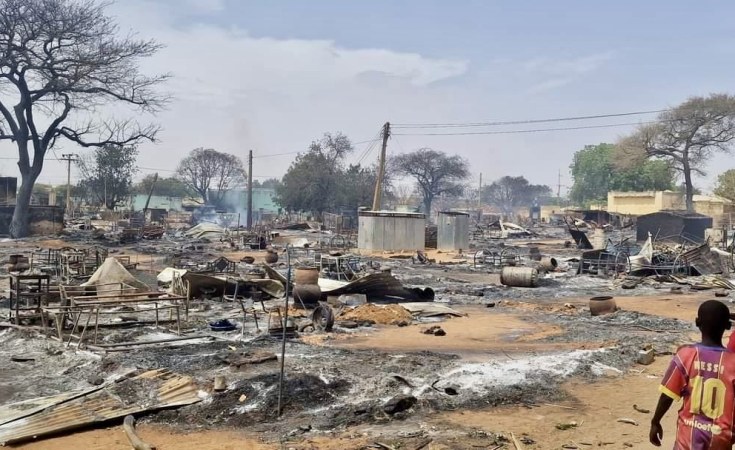Aj Jazirah, Sudan — "Some parents were killed while trying to protect their daughters from being raped," said Sara*, a counsellor in Sudan's eastern Aj Jazirah state and one of many health workers relaying shocking accounts of sexual violence in recent weeks.
Since 20 October, escalating conflict in Aj Jazirah has led to the deaths of over 100 people, including health workers, and forced more than 135,000 to flee their homes in search of refuge in neighbouring states. With at least six health facilities attacked, even essential services have been severely disrupted and patients are being transferred to alternative health centres, although only one in four are currently operational in Aj Jazirah.
Reports from the State Ministry of Health indicate severe human rights violations have been carried out during the attacks, with women and girls from the ages of 6 to 60 subjected to rape and sexual assault.
"You don't see young women in some camps," one health worker explained to UNFPA, the United Nations sexual and reproductive health agency. "Some girls who arrived in Gedaref said friends were left behind."
UNFPA-supported counsellors in Gedaref are caring for women and girls in shelters who recently fled Aj Jazirah. Some reported seeing women throw themselves into the river to avoid being abused by armed men; in a displacement camp in Kassala, others shared painful warnings from their families before they left: "If we see armed fighters come to the village and attempt to rape you, we will kill you to protect you before this happens."
The stigma of sexual violence
Such is the level of stigma meted out to rape survivors - and their relatives - that many are turning to devastating measures to cope. "Survivors of sexual violence are running away and hiding because their families have threatened to end their lives to wash away dishonour," explained a counsellor in Gedaraef, who did not wish to be named for safety reasons.
A number of girls said their brothers, fathers and uncles had provided them with knives and instructed them to "take their own lives if threatened with rape."
"We can't access most [survivors] because, first, they are in denial or afraid of being accused or targeted," continued the counsellor. "Second, they fear that if they disclose their experiences, they could lose their lives."
Lives uprooted, and upended
UNFPA has also heard alarming reports of looting, threats and widespread attacks on homes, prompting mass and sudden displacements. Aliya's* family was attacked in Aj Jazirah, forcing her to flee on foot. "They took everything from us, we left with nothing. They beat us like dogs."
But their journey was no less arduous or dangerous. "We walked for seven days under the sun without anything to eat. Some women died on the way - there was no water to drink, they died of thirst."
Like countless other women caught up in this spiral of violence, Aliya is now the sole carer and provider for her uprooted family. "Our men were left behind in the village. I don't know where my husband is... Maybe they killed him. I swear, I don't know what has happened to him," she told UNFPA.
"I have six children. We need clothes, shoes, food, soap - we have nothing."
Mariam*, escaped to Kassala after her husband was killed. "They came to our house, threatened us, and tried to take my daughters. I told them my daughters were married. Then they demanded gold and money, but I told them I had none. So they took me and my oldest daughter and beat us.
"One of my daughters is immunocompromized, and I fear she might die from malnutrition," she continued. "I use my own clothes to cover my newborn baby, who is only four months old."
A flexible, but underfunded, response
Since the escalation of violence in Aj Jazirah, UNFPA has provided over 1,200 consultations on sexual and reproductive health through five mobile health teams deployed to Gedaref State, with funding from the governments of Canada, the Republic of Korea, Sweden, the United Kingdom and the United States.
An additional health team is planned to be sent to Al Butana, as well as a mobile health and psychosocial support unit to the Elfao Hospital, which UNFPA has equipped with clinical post-rape supplies. The New Halfa and Khashm El Girba hospitals in Kassala, were also provided with these essential kits.
UNFPA is currently supporting 49 women and girls' safe spaces across Sudan, providing essential gender-based violence prevention and response services. But with the escalation of violence and increasing insecurity, much more is needed to ensure safe, rapid access to life-saving support can continue to be provided for all women and girls in urgent need.
*Names changed for privacy and protection


